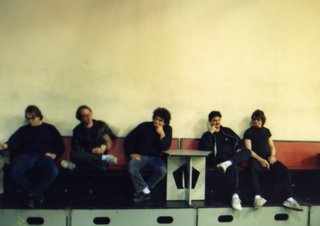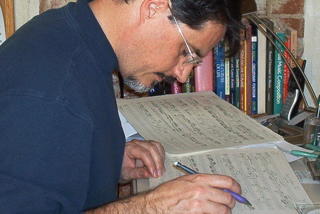
In my last posting I said that I thought 'Strange Sounds from the Basement' ('SSftB,' hereafter) was our masterpiece. I'll try to justify that opinion now, as well as explain why the album missed its mark with our record company.
In my own view of art, the works that are most lasting are those that convey some powerful truth, yet avoid oversimplification. They are not afraid to confront and illuminate the ambiguities of life. (This is why there is very little good art made by any sort of fundamentalists: they fear, and thus seek to eliminate, ambiguity.) Chuck loved ambiguity, he revelled in it. On this album he made a declaration of the fact, in "Colorblind's Night Out:"
"Oh Lord it makes me feel so good, when I don't know where I stand"
In SSftB, Chuck pushes that concept into distant realms, which is probably one reason why the album is so misunderstood. The opening track makes a good case in point. In "Ribbon Cutting Time" the first verse opens with the declaration that "I keep my eyes on each step I climb" and I think that this is crucial to the understanding of the song. The song's character sets an idyllic tone, almost hilariously clichéd, singing that "Leaves are on the trees, ducks are on the pond, the sun is shining brightly, all the clouds are gone." As the song progresses, with the protagonist describing his difficult life, it becomes clear that he's been warped and embittered by the journey. The final verse is heartbreaking in its callousness and cruelty:
I'm stepping over bodies,
Stepping on bare feet,
If they can't keep up with the pace,
Get 'em off the street.
I'm through with all your charities
Get lost, what's mine is mine
I've worked hard for what I've got,
It's ribbon-cutting time.
After hearing this last verse, the first line takes on a much more ominous implication. Yet almost no-one that I know of outside the band heard or understood this amazing transformation. It just seemed to be a simple folk song. The complexity is heightened by the accompaniment over these lines, where the clarinet and trombone evoke a church organ's sustained chords of piety and devoutness, in ironic contrast to the uncharitable words of the song's character. He is Scrooge, without the Christmas transformation, clearly revealed in his meanness of spirit. Operas, novels and films have been written to illustrate this theme, and not conveyed it nearly so well.
One of the other strengths and difficulties of Chuck's songwriting was its humor. Having a sense of humor is something of a two-edged sword. If you are funny often enough, people will assume you're not really serious about much of anything. This was surely not the case with CbJ, nor the the rest of the band; we were deadly serious about our work, and being aware of humorous implications was often part of that work. Yet humor is an elusive element, and what translates as funny in one place may not do so somewhere else. I now think that Chuck's humor has a Northeastern sensibility (whatever that means), which does not always resonate with other parts of the country. For example, when I moved to central Florida, in an area that was really a part of the deep South, I found almost no-one liked the band or understood the songs at all. The Brits got our humor fairly well, though other Europeans found a lot of our songs utterly baffling.
We all respected Chuck's songwriting enormously, and we worked very hard to realize his particular vision for a song, sometimes even giving up a cherished solo or part that we had painstakingly devised. I remember a couple of brilliantly executed solos that Phil had composed (one being for "Buster Cornelius") that Chuck simply thought were wrong for the song. This could be a hard pill to swallow, but swallow we did. (In a comment on the previous posting, Phil describes how he had to give up his original solo on the album's title track, something I'd never known before now.)
The title track demonstrates an unusual kind of virtuosity, that being this band's ability to play in very slow tempos. Very. Slow. Tempos. This is much harder than it sounds, and we excelled at it. I like the way we illustrate the peculiar images that Chuck evokes in each verse, and I always laughed to myself when we played it at his description of the "pop-rock combo" that consisted of "two tubas, a saxophone, and a clarinet." Only in Chuck's world would such a group be thought of as "pop-rock." The difficulty in a song like this is to keep the listener engaged, despite the slowness of the tempo and the languid delivery of the lyrics. Actually, it was quite successful in performance. If you were on the band's wavelength, songs like this could be exhilarating, especially in contrast to the frenetic two-beat songs we did, such as "Kojak Chair" or "Talk to Me." I had always argued that this should be the album's opening track, but less radical heads (including Chuck's) prevailed and it was consigned to the opening of the LP's Side Two.
Another song that was generally misunderstood was "Jesus at the Still," which described a moonshiner's encounter with Jesus while working one night. In one sense, the song is a sort of parody of hillbilly gospel songs, and that was how most people tended to view it. But it also had a deeper layer, that of exploring the Catholic tradition of visions and visitations. Was it sacreligious? Some thought so, some didn't. The ambiguity bothered some folks, that's for sure. In a certain way, Chuck's religious songs acted as a sort of mirror of your own spiritual state. If your beliefs led you in a certain direction, you heard the song a certain way. Or otherwise. The album's genial surface fooled a lot of people into thinking there wasn't much there. Songs like "Two-Headed Girl," "Sidewalk Sale" or "Acorn Girl" didn't seem to be about anything in particular; the general lack of apparent angst fooled a lot of folks. "Not for Sale" was especially deceptive in this case—a bitter lob at the folks who'd engineered our disastrous tour a couple months before and was a line in the sand of sorts.
All in all, now that I think about it, I suppose we're lucky the album sold as well as it did. It is a truly strange record, and its radical qualities are hard to perceive. I still get mad about the fact that it was never released in the States, where I think it would have done a lot better.



